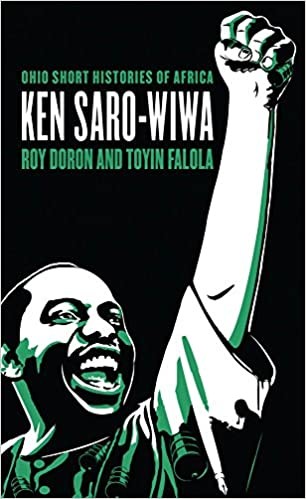Ohio University Press has a series of "Short Histories of Africa". I recently decided to pick up most of the collection for potential use as reading materials for classes. This post covers "Ken Saro-Wiwa" (2016) by Roy Doron and Toyin Falola. Unlike other books that might gloss over some of the more problematic choices made by Ken Saro-Wiwa, this books claims to present the full, complex picture. In that regard, this is an insightful book, even if might change how some view him and his legacy. The book is also a useful introduction to Nigeria, as well as the biography. A few notes:
"Saro-Wiwa is best known for his activism against the Nigerian state and Shell Oil's destruction of his Ogoni homeland and his defiant stance in the face of his illegal and immoral execution, the man himself was infinitely more complex." (p. 9)
"Ogoni residents refused to cooperate under these terms, stating, "Greater damage was also done to land and soil, drinking water, fishing ground, villages and air." Shell made no move to remove the oil from the infected streams and rivers because this oil was no longer economically viable, and the Nigerian government did not extend any aid to the afflicted areas. It was only thirty years later, in 2000, that a Port Harcourt fined Shell GBP 26 million for the spill." (84-85)
"Indeed, between 1970 and 2000, the Niger Delta and the Ogoni endured unrelenting suffering. The scale and scope of oil spills in the Delta are staggering. Between 1976 and 1996, seven thousand reported spills flooded the region with over two million barrels of oil; 77 percent of the lost oil became immersed in the soil and waterways. These spills were the result of both oil industry negligence and third parties rupturing pipelines to steal oil." (p. 85)
"Saro-Wiwa had to find a way to internationalize his people's predicament in a way that would resonate globally and ensure effective mobilization. His goal was to build an international coalition that would pressure both the Nigerian government and the companies doing business with it. To this end, he connected the environmental catastrophe with the idea of genocide with the claim that the environmental damage was indeed "inflicting on the group conditions of life calculated to bring about its physical destruction in whole or in part" (p. 110)
"Saro-Wiwa, acutely aware of the power of language, and of the word genocide in particular, articulated grievances in a new way, driving global activists to confront offending states and forcing a reckoning with any entity, public or private, that collaborated in perpetrating genocide. Thus, Saro-Wiwa not only expanded the definition of genocide in public opinion, if not in international law, he altered the perspective of the global community in a way that directly confronted governments, non-governmental organizations, and corporations to seek justice for the aggrieved parties." (p. 150)

